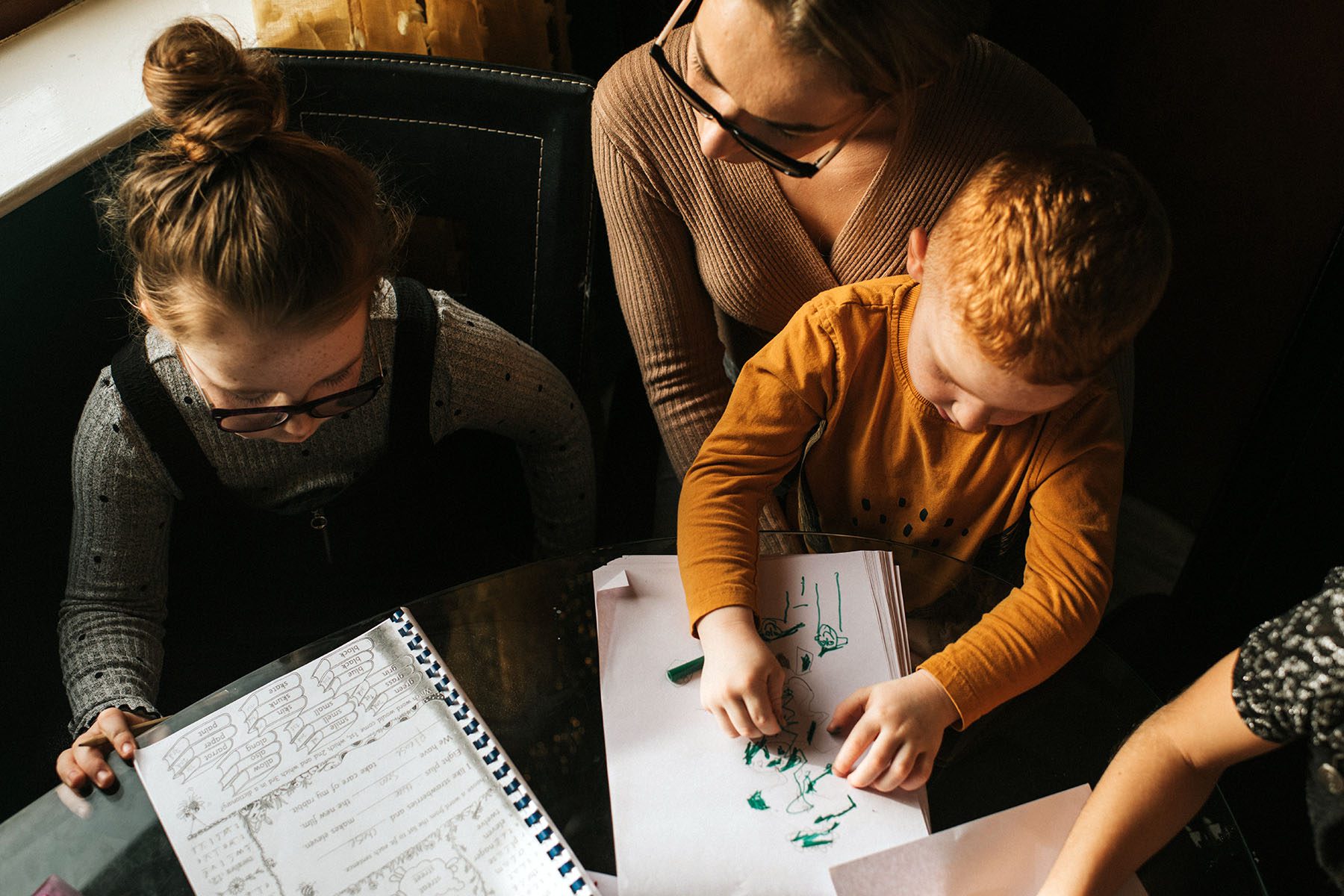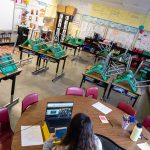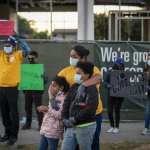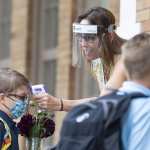Maritza Guridy spent the week constantly checking the School District of Philadelphia’s website. The mother of four couldn’t be sure each morning whether her children’s schools would have virtual or in-person classes. On Monday, the School District of Philadelphia announced that 77 of its 323 schools would offer only online instruction through the end of the week due to COVID-related staffing shortages. By Tuesday evening, the total number of Philadelphia schools slated to go virtual had expanded to 84, including the elementary school of Guridy’s youngest children.
The district updates the list of schools switching to online instruction throughout the day on its website, and on Wednesday, the number of schools shifting to distance learning shot up to more than 90. Guridy has been monitoring the website to see if her eldest child’s high school will be added to the list.
“Now it’s still a wait-and-see situation,” said Guridy, northeast regional organizer for the National Parents Union, a network of parent organizations and grassroots activists advocating for families in education. “It’s just seeing whether or not they’re going to say, OK, ‘All schools will be virtual, at least until next week.”
Many of the nation’s roughly 100,000 public schools are continuing with in-person instruction after returning from winter break, but a number of districts, including Pittsburgh, Atlanta, Chicago and Newark, announced that schools would switch to remote learning or close entirely as the omicron variant surges and sends children to the hospital in record numbers. Soaring coronavirus cases and reversion to virtual learning have dashed hopes that this school year would mark a return to normal for students, thus giving mothers — who researchers say have disproportionately navigated their children’s education during the pandemic — a break from balancing their careers and the demands of remote learning. Last-minute school closures, staffing shortages and long waits for coronavirus tests have caused families to scramble, parents and experts told The 19th.
“Almost all parents that we’ve talked to struggle when schools change course on a dime,” said Jessica McCrory Calarco, an Indiana University associate professor of sociology who co-authored a research paper about the decisions more than 2,000 parents made regarding their children’s education during the pandemic. “Families would be dealing with less stress at school if school districts could make decisions in a way that allowed for more lead time. Of course, that’s not always possible, but I think there would certainly be a preference for making decisions more preemptively as opposed to waiting for staffing-related closures or until it gets to a tipping point where you just can’t physically open the school.”
Calarco’s research has found stark differences in school decision-making depending on a parent’s racial or socioeconomic background. Larger numbers of low-income women of color have become unemployed during the pandemic, she said, making them less resistant to virtual instruction than upper-income White families in which both women and men have been more likely to keep their jobs.
“Parents are not a monolith,” Calarco said. “There isn’t one single set of concerns or one single set of constraints that families are facing. Parents are approaching in-person learning much as they approach other decisions that they make for their kids’ lives. They balance the trade-offs; they think about what are the implications healthwise and what are the implications economically for our families. What are the implications in terms of our mental health and our stress levels?”
Those are the kind of trade-offs in the balance for Guridy. Although she opposes long-term virtual instruction, Guridy would rather schools err on the side of caution and offer remote learning for the next couple of weeks than risk coronavirus outbreaks on campuses. But online learning often requires mothers to make sacrifices. Mothers of school-age children were 0.7 percent more likely to leave the workforce during the first waves of the pandemic than women without children, and mothers with telework-compatible jobs were 0.8 percent more likely to leave, according to a study by the Federal Reserve Bank of Minneapolis.
“It’s a juggling act,” Guridy said of balancing her job, which she performs remotely, with having her children home during weekdays.
The chaos and uncertainty that parents are facing as schools go virtual with little notice might have been avoided if districts had provided families with at-home rapid COVID tests before winter break or decided to keep schools closed this week, allowing officials to work out a plan to keep students and staff safe, Guridy said. She contracted COVID just before Christmas and could not book tests for her children, who range in age from 5 to 16, before school resumed session. As a result, she’s decided to keep them all home until she obtains negative test results for them. According to Monica Lewis, a School District of Philadelphia spokesperson, Philadelphia schools offered COVID-19 testing at six sites over the break.
In case her children have contracted the virus, Guridy wants to ensure that they don’t expose anyone else to COVID. But she fears other parents won’t do the same.
“There are going to be many, many, many asymptomatic children walking into these school buildings,” she said.
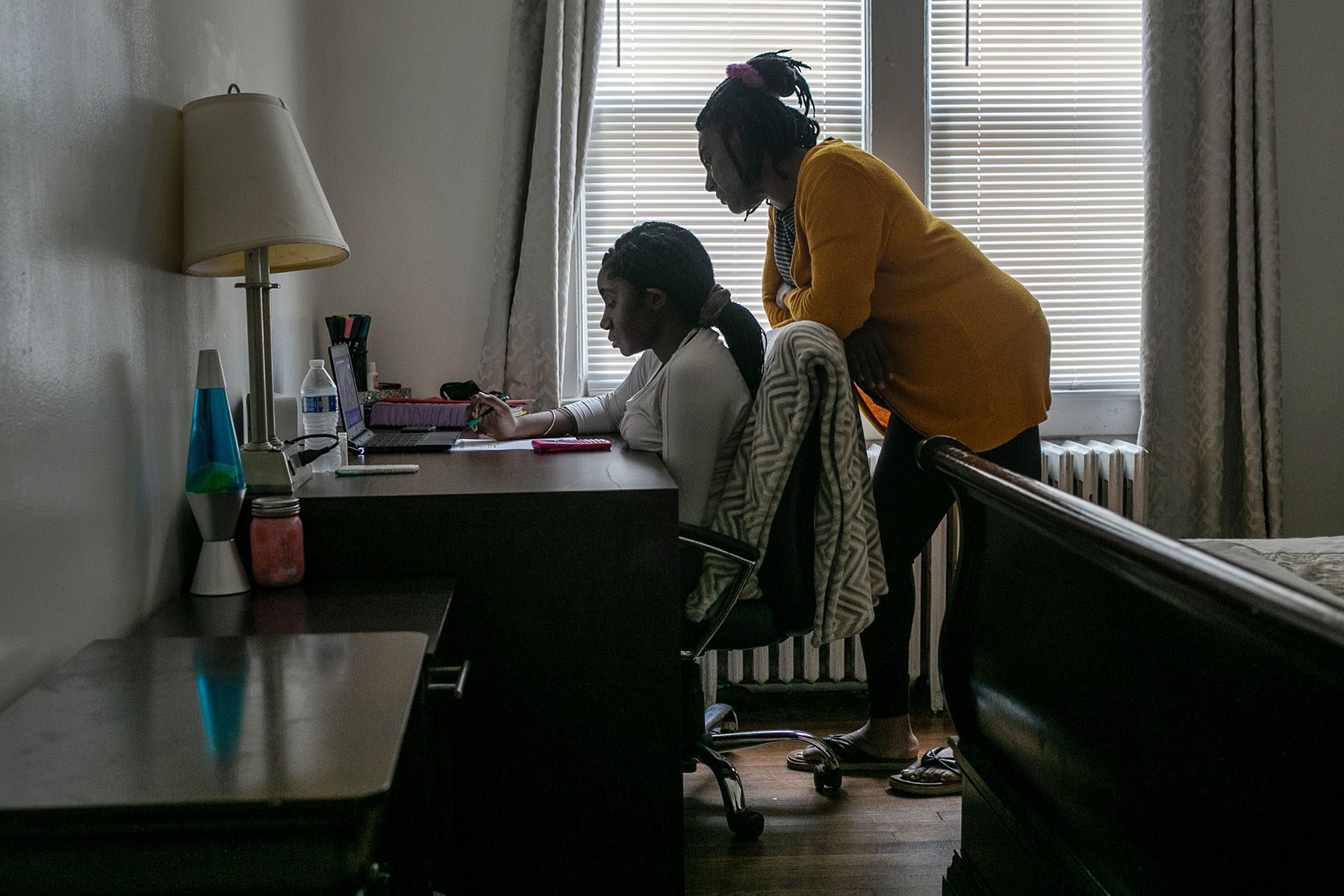
(John Moore/Getty Images)
In school districts such as Atlanta and Newark, parents are also coping with virtual instruction once more.
With three children ranging in age from 4 to 15, Maria Gomez said that COVID-19 is “absolutely concerning,” but she also worries about the toll remote learning has had on her children. Atlanta Public Schools, which her children attend, announced that classes will be remote through the end of the week. Now, she’s worried that online instruction will extend beyond that timeframe.
“We don’t know whether we are going to have to be virtual until the end of the school year,” said Gomez, a grassroots leader with the Latino Association for Parents of Public Schools. “My children were starting to get excited because they were back in person, and then now that we got the news that we’re going to be virtual, at least for now, you can already see the worry that they’re not going to get what they need in terms of [academic support]. It’s certainly concerning as a parent to see the kids have to go through this process.”
Both Gomez, an employee of a catering business, and her husband work outside the home. This gives her 15-year-old son the responsibility of caring for his two younger siblings when schools switch to remote learning. Her preschooler needs extra care and attention, Gomez said, and her fourth-grader struggled academically when schools went online during 2020 and early 2021. Gomez had to find her middle child tutoring to prevent her from falling behind, and she’s unsure how her children will be affected if remote learning lasts for weeks or months.
As a mother, Gomez has had a steep learning curve herself, as she’s had to figure out how to use the technology her children need for online instruction. Although her husband also helps the children with their education, Gomez said that mothers have certainly taken on more responsibilities during the coronavirus crisis.
“For everybody, it was a lot more work, particularly for mothers,” she said.
That’s been the case for social worker Viva White, mother to an eighth-grade special education student in New Jersey’s Newark Public Schools, which announced that classes would be virtual through January 14. White wishes the school district had made the announcement before the winter holiday instead of toward the end of the break to give parents more time to prepare, but she also said that she understands the decision to switch to remote learning as COVID-19 cases rise. Streamlining the testing process at schools, requiring students to be vaccinated and providing transparency about the number of active coronavirus cases are some of the measures White argues schools should take to safely stay open.
In the meantime, she’s concerned about how her son, who struggled academically when schools previously went remote for extended periods, will fare this month. White has been working from home during the pandemic but said that it is difficult to manage her responsibilities as a social worker with her son’s needs when he takes part in remote instruction.
“He sees me at home, so he thinks that I can tend to him, but I can’t really because I have to do work,” she said. “I have two competing priorities, and both are just as important. So, what do you do?”
It is a question teachers and administrators know they have to take into account.
Philadelphia schools serve families from a variety of economic backgrounds, including those too impoverished to buy their children N95 masks and other personal protective equipment, said Jerry Jordan, president of the Philadelphia Federation of Teachers. The union urged the school district to delay reopening this week. Instead of resuming classes, the district should have spent this week devising a plan to provide masks to students, conduct regular COVID testing, ensure that classrooms have adequate ventilation and implement other mitigation measures, according to Jordan. (Lewis said that the district has been providing personal protective equipment to students and working to improve ventilation in classrooms.) Parents didn’t deserve to kick off January uncertain about whether schools will be open for in-person or virtual instruction, he said.
Lewis said that the district aims to keep schools open as long as they have enough staff to safely do so. As staff numbers fluctuate, the district has had to shift some schools back to virtual learning, but the goal is to keep them open for as long as possible, she said. She cited the Centers for Disease Control and Prevention’s stance that in-person learning is best for students.
But in holding out until the cases hit a critical number, officials inadvertently create a logistical problem when schools have to close.
“Parents really deserve and need ample time to plan for their children and how their children will be cared for,” Jordan said. “If there is virtual schooling, parents need advance notice and also they need to understand the reason why. I’m sure most of the parents went to sleep [Monday] night thinking, ‘My child’s going to be at school tomorrow because that’s what the district has said,’ only to find out that, ‘No, my child is not in school or school has been made virtual, and I’ve got to go to work. Who do I call?’ That was a very difficult position for parents to be in.”
